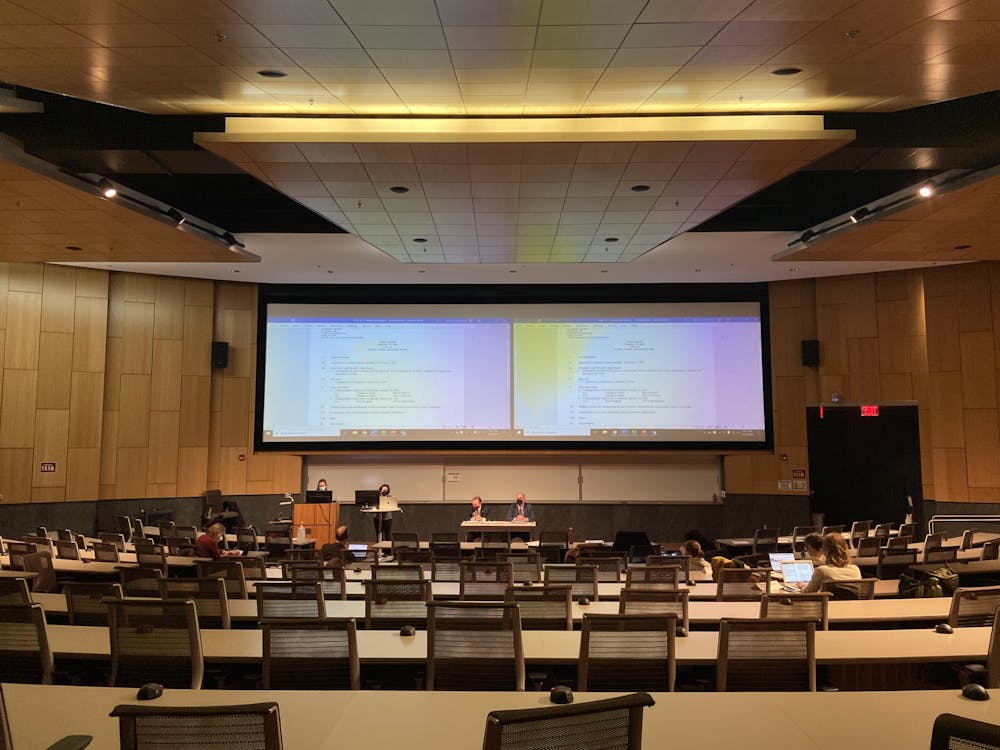Academic Senate discusses declining enrollment
The Academic Senate began with a discussion about Central Michigan University’s trend of declining enrollment at its bi-weekly Tuesday meeting.
Senator Martha Frank said she and other faculty have growing concerns for CMU’s future. Frank also asked Interim Provost Richard Rothaus if he was aware of an April 3 Detroit News article titled “CMU’s enrollment is plummeting. Some worry about its viability.”
“I don’t have a Detroit News subscription, but the headline, I think, is scary enough,” Franks said. “Our enrollment issues are pretty well known, and there is a feeling—on the part of some faculty—that maybe we’re not going to be around for much longer as a university.”
Rothaus said the story was another “variation on what everyone already knows—that our enrollment is down.” He also said it is “incredibly hyperbolic” to say CMU is not viable as a university.
“Colleges that close have numbers like 750 students left on campus and the board has no choice but to (close),” Rothaus said. “We have 12,000 students on campus and we have 15,000 students total. That’s not as many as the heyday of 25,000 students, but these stories grab that maximum number…and if they’re not at that maximum number, they predict gloom.”
Frank said the Department of Mathematics had almost 4,000 students taking math classes several years ago but has dropped to below 2,500 students as of Fall 2021.
“That concerns me greatly,” Franks said to Rothaus. “I’m glad you’re optimistic about those numbers but I am not, and many other faculty members are also not optimistic.”
Rothaus promoted CMU’s "Maroon and Gold" events for prospective students to learn about CMU from faculty and staff. He said everyone at CMU should take part in recovering enrollment.
“This has gone way beyond telling faculty to go to Maroon and Gold events,” Frank said. “That’s a great idea, but I think we need to do substantially more than that. I think we’re in a situation where this needs to come from the top to make driving enrollment one of our top priorities.”
Rothaus agreed with Frank that CMU must be “transformative” in its approach to improving enrollment.
Curriculum and academic integrity policy changes
The senate passed a list of recommended changes to the Curricular Authority Document, which has been an ongoing discussion topic.
The list was created by the Curricular Process Review Committee (CPRC). According to the list of changes, using the CAD is “cumbersome” and the goal of the committee was to make it easier and less time-consuming for anyone involved in planning courses.
Changes to CMU’s Policy on Academic Integrity were also passed. Mathematics chair Ben Salisbury said the changes were meant to clarify the meaning of cheating and academic dishonesty. Senate Chair Katrina Piatek-Jimenez said the changes also address the increase in cases of academic dishonesty since the start of the COVID-19 pandemic and virtual learning.
Director of Student Conduct Tom Idema said some faculty asked his office to search online study resources, like Course Hero and Chegg, for course materials.
“One of the things we’ve learned is that there’s a huge amount of material that is out there on these sites that is not supposed to be there,” Idema said. “Your latest quizzes, tests, exams and papers are out there.”
Idema said CMU does not currently pay for subscriptions to study websites where faculty can find course materials and have them removed.
Graduate program changes
The senate passed several changes to some of CMU’s graduate programs, including credit hour alterations and a new certificate program.
Graduate students at CMU who want to earn an additional graduate degree under the same discipline can now double count up to nine credits. Previously, graduate students could only use six credits twice. Senator Brad Swanson said the change was made to compete with graduate programs at other universities.
The senate voted to modify the Doctor of Medicine degree. The program now requires 243 credit hours instead of between 235 and 241.
A new graduate certificate called Disability Studies & Community Inclusion was also approved. The program “will enable students to move from sympathetic to empathetic approaches of empowerment and engagement with people that have disabilities from diverse backgrounds and diagnoses.”
Academic Senate meetings are held at 3:30 p.m. bi-weekly on Tuesdays in the French Auditorium. Livestream and recording links can be found on the senate website.




